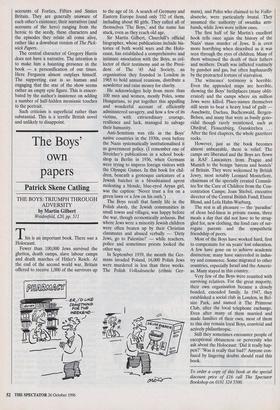The Boys' own papers
Patrick Skene Catling
THE BOYS: TRIUMPH THROUGH ADVERSITY by Martin Gilbert Weidenfeld, £20, pp. 511 This is an important book. There was a Holocaust.
Fewer than 100,000 Jews survived the ghettos, death camps, slave labour camps and death marches of Hitler's Reich. At the end of the second world war, Britain offered to receive 1,000 of the survivors up to the age of 16. A search of Germany and Eastern Europe found only 732 of them, including about 80 girls. They called all of themselves 'The Boys,' and the name has stuck, even as they reach old age.
Sir Martin Gilbert, Churchill's official biographer, whose publications include his- tories of both world wars and the Holo- caust, has established a comprehensive and intimate association with the Boys, as col- lector of their testimony and as the Presi- dent of The '45 Aid Society, an organisation they founded in London in 1965 to hold annual reunions, distribute a newsletter and raise money for charity.
He acknowledges help from more than 100 men and women, mostly Poles, some Hungarians, to put together this appalling and wonderful account of efficiently administered savagery, and how a few of its victims, with extraordinary courage, resilience and luck, managed to salvage their humanity.
Anti-Semitism was rife in the Boys' native countries in the 1930s, even before the Nazis systematically institutionalised it as government policy. (I remember one of Streicher's publications in a school book- shop in Berlin in 1936, when Germans were trying to impress foreign visitors with the Olympic Games. In this book for chil- dren, beneath a grotesque caricature of a Jewish butcher in a bloodstained apron molesting a blonde, blue-eyed Aryan girl, was the caption: 'Never trust a fox on a green lawn or a Jew on his oath.') The Boys recall that family life in the Polish shtetls, the Jewish communities in small towns and villages, was happy before the war, though economically arduous. But where Jews were a minority Jewish children were often beaten up by their Christian classmates and abused verbally — 'Dirty Jews, go to Palestine!' — while teachers, police and sometimes priests looked the other way.
In September 1939, the month the Ger- mans invaded Poland, 16,000 Polish Jews were murdered in less than three weeks. The Polish Volksdeutsche (ethnic Ger- mans), and Poles who claimed to be Volks- deutsche, were particularly brutal. They assumed the authority of swastika arm- bands, while Jews wore yellow ones.
The first half of Sir Martin's excellent book tells once again the history of the Nazis' mass murder of Jews. It is even more horrifying when described as it was seen through the eyes of children. Many of them witnessed the death of their fathers and mothers. Death was inflicted routinely by gunshot and gas, but often haphazardly by the protracted torture of starvation.
The witnesses' testimony is horrible. Even the appended maps are horrible, showing the Boys' birthplaces (many oblit- erated) and the camps where six million Jews were killed. Place-names themselves still seem to bear a heavy load of guilt Auschwitz, Dachau, Buchenwald, Bergen- Belsen, and many that were as busily geno- cidal though rarely mentioned, such as Ohrdruf, Flossenbfirg, Gunskircheu . . . After the first chapters, the whole gazetteer reeks.
However, just as the book becomes almost unbearable, there is relief. The camps are liberated and the Boys are flown in RAF Lancasters from Prague and Munich to the benign 'havens and hostels' of Britain. They were welcomed by British Jewry, most notably Leonard Montefiore, chairman of the specially created Commit- tee Tor the Care of Children from the Con- centration Camps; Joan Stiebel, executive director of the Central British Fund; Elaine Blond, and Lola Hahn-Warburg.
The rest is all pleasure — the 'paradise' of clean bed-linen in private rooms, three meals a day that did not have to be strug- gled for, new clothing, the fond care of sur- rogate parents and the sympathetic friendship of peers.
Most of the Boys have worked hard, first to compensate for six years' lost education. A few have gone on to achieve academic distinction; many have succeeded in indus- try and commerce. Some migrated to other countries, especially Israel and the Americ- as. Many stayed in this country.
Very few of the Boys were reunited with surviving relatives. For the great majority, their own organisation became a closely bonded, extended family. In 1947, they established a social club in London, in Bel- size Park, and named it The Primrose Club, after the local telephone exchange. Even after many of them married and made families of their own, most of them to this day remain loyal Boys, convivial and actively philanthropic.
Still they sometimes encounter people of exceptional obtuseness or perversity who ask about the Holocaust: 'Did it really hap- pen?' Was it really that bad?' Anyone con- fused by lingering doubts should read this book.
To order a copy of this book at the special discount price of £16 call The Spectator Bookshop on 0181 324 5500.


















































































 Previous page
Previous page